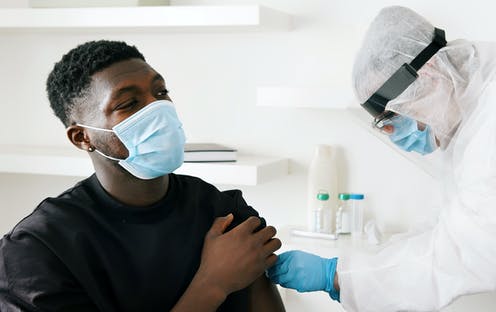
CameraCraft/Shutterstock
COVID vaccines protect people from severe illness and death, but in the UK, they’re not doing so evenly. While overall uptake of COVID vaccines in Britain is high, it isn’t uniform across all ethnic groups.
At the beginning of December, 90% of all white people aged 50-54 had been vaccinated with a first dose, compared with just 62% of those of Caribbean heritage, 74% of those of African heritage and 87% of those of Indian or British Indian heritage. Such differences are found across all age groups, although the size of the difference varies. Uptake of boosters is also lower in ethnic minority groups, again varying by age and ethnic group.
Hospital admissions reflect the consequences of this. Of critically ill patients admitted to intensive care units in England, Wales and Northern Ireland between May and December 2021, almost 8% were Black, compared to a local Black population of just under 5% in the areas covered by these data.
And of pregnant women with COVID admitted to intensive care, 24% were Asian, even though Asian people made up only 10% of the population covered. South Asian people also have much higher rates of long COVID than the majority white population, as do Black people.
Vaccines remain a central defence against COVID, and even more so now the omicron variant has emerged. Boosters are Britain’s main weapon for limiting omicron’s impact. Vaccine uptake needs to be as high as it can be. What, then, is limiting uptake in some ethnic groups – and what can be done about it?
Getting to the root of the issue
This is what Collaboration for Change project wanted to find out. Run jointly by nine UK ethnic minority community organisations, two community-focused small enterprises and two UK universities, our ultimate aim was to find out how to enhance vaccine confidence across ethnic minority communities in Britain.
We began by identifying factors that affect vaccine uptake in ethnic minority adults – specifically of vaccines used to protect against diseases of the lungs and airways. Looking across academic research, we found 31 relevant studies from the UK, the US and Australia. From these, we identified six factors that potentially influence uptake.

/Shutterstock
We also wanted to find ways of increasing vaccine uptake in ethnic minority adults, and so looked in the relevant research for strategies that had been suggested or tested. The papers indicated three that might improve uptake.
But would this information from past research be relevant now in the COVID pandemic? And would it be applicable to the UK? To find out, we summarised these findings and organised a series of online discussions between the project partners. Representatives from the community organisations, together with other members of our collaboration, discussed the findings for around 12 hours to check their accuracy and applicability to the UK’s current context.
When discussed, all the factors and strategies were considered important and relevant to COVID vaccination among ethnic minority groups in the UK. No additional factors or strategies were suggested. However, the discussion showed that some of the six factors were linked and so could be combined. This left us with three barriers to vaccine uptake that we could be highly confident of being accurate.
The first is that, for many people from ethnic minority groups, there’s a lack of trust in the individuals and organisations that advise on vaccine uptake.
The second barrier is that there’s little linguistically and culturally appropriate information on matters of concern about COVID vaccines, including honest discussions of benefits and harms. Information provided might be factually accurate, but only available in English, when people speak other languages. Or it might be overly technical, or unobservant of cultural values and norms.
The final barrier is a practical one: inconvenient timings and locations for vaccine appointments.
The discussions revealed that lack of trust in particular drives many vaccination decisions. Sundus, one of our community organisation partners, summarised it like so:
There is a “hostile environment” in the UK which goes beyond the healthcare system and vaccinations; other injustices, such as Windrush and the Grenfell Tower fire, have contributed to a lack of trust. These set the tone for minority ethnic voices not being heard or believed. A “broken relationship” exists.
How to increase uptake
It should come as no surprise that the ways suggested to improve vaccine uptake aim to tackle each of these barriers in turn. The research and discussions underlined the need to use trusted messengers, make sure that vaccine information is appropriate to the community being targeted, and be flexible about venues and times for vaccination. Any approach to increasing vaccine uptake in ethnic minority communities needs to consider all three strategies.
These strategies sound simple, but none can be done well without knowing who is trusted, what is appropriate and how to be flexible. Answering those questions needs direct engagement with organisations that understand and have the trust of ethnic minority communities.

Zoran Zeremski/Shutterstock
Indeed, this is one of our key lessons: organisations promoting vaccine uptake need to engage directly with ethnic minority communities to correctly tailor their efforts to get more people vaccinated. Messaging, for example, may be scientifically correct, but often uses language that means the message is lost. As another community organisation partner, Phanuel, put it:
People naturally delivering messages on social media was resonating more than the corporate speak of public health messaging. Need to ask, how would you deliver this message if you were talking to friends on WhatsApp?
Finally, evaluation of vaccine strategies is crucial. We uncovered what might work, but there’s remarkably little rigorous evidence on the effect of any strategy to improve vaccine uptake in ethnic minority groups, whether for COVID or any other disease. To protect as many people as we can in the future, that needs to change.
![]()
Shaun Treweek has received funding from the UK Economic and Social Research Council (grant ES/W001403/1).























